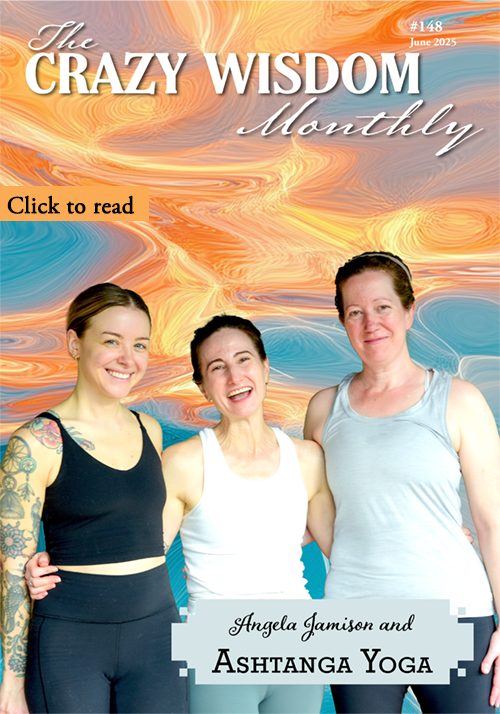Awareness helps us understand and neutralize situations, allowing them to feel less personal. Unconscious patterns like bullying, judgment, and anger become conscious as our awareness grows. As the saying goes, “hurt people hurt people.” When awareness grows, and we become conscious of our emotions, we are more able to transcend behaviors that cause us (or others) to be hurt
Corona Retreat
Solitary retreats are a familiar experience for me. I’ve been taking off into the woods to retreat all of my adult life. After I had cancer ten years ago, I scheduled these retreats as many as six times per year to support my healing process. Retreating alone has been an important piece of my self-care and a way to deepen into my meditation practice.
Why Practice Mindfulness?
by Barbara Newell
When Laura Cowan interviewed me for her cover article in the current Crazy Wisdom Journal, we touched on the two main avenues of practice for cultivating mindfulness in everyday life. Ms. Cowan wrote candidly about the parent’s classic dilemma: wanting to enjoy the proven benefits of mindfulness in relating with herself, with her loved ones, and all the ups and downs we all encounter in life, yet feeling stretched too thin to add another item to the to-do list. The avenue of finding small ways to be more present right in the midst of what’s already happening throughout the day came naturally to the forefront of our interview.
The other avenue is the one commonly referred to as “formal practice.” It doesn’t have to mean sitting in the lotus position at an altar with incense burning (as lovely as any or all of these things can be). It simply means setting aside some minutes in which we don’t do anything else except reconnect, again and again, with our “home base” of mindful presence.
For many people, this home base is following our breathing; others find a different anchor works better for them. In it we give ourselves full permission to let go of our agendas. Every time we notice our mind has wandered off (as human minds are wont to do!), over and over again, we bring the mind back to this home base of spacious, kind presence. It seems so simple – which it is – and yet countless people have found it really makes a difference.
One well-known, busy mom I know made herself a deal one day many years ago now. She vowed that henceforth she would meditate every day – and - she gave herself what she calls the “back door” that it didn’t matter for how long. There were times, particularly when her son was quite young, when it was just taking a few conscious breaths and saying the briefest prayer at night, on the edge of her bed, before keeling over; yet her promise to herself made a real difference.
These two approaches to cultivating mindfulness very much support each other. When we take a few dedicated moments to really pause and reconnect with wakeful, caring presence to our own heart, it’s much easier throughout the day and week to take the micro-pause in a challenging moment - even a single, mindful breath - that gives us just enough room to check in with ourselves and respond to the situation instead of habitually reacting to it in a way we may regret later.
Similarly, when we do take short windows of opportunity to resource ourselves throughout an active day - how about just enjoying a few refreshing, conscious breaths when we’re at a stoplight, instead of looking down at our phone for the hundredth time? - there will be less accumulated restlessness when we do take those dedicated minutes to come back to the miracle of our living, breathing body, here in the present moment.
Recently I recalled a brief exchange that took place nearly 25 years ago, when I was quite new to meditation. I was just meeting a woman living with metastatic, stage 4 breast cancer. Within a couple minutes we somehow discovered that both of us were meditators. Suddenly her dark-brown eyes bored intently into mine, with a fierce gaze from which life’s trivialities clearly had been burned away. She got straight to the point: “When the mind is in the present moment... there is no fear.”
My mind came to a complete stop. It was beyond question this woman knew what she was talking about. I knew that I needed this practice.
I am grateful to her.
You can reach Barbara Newell at Grove Emotional Health Collaborative’s office on Main Street at www.groveemotionalhealth.com or by contacting her at barbara@groveemotionalhealth.com and (734) 224-3822 x113.
To learn more about Barbara, read Crazy Wisdom Kids in the Community—Mindfulness with Barbara Newell, Joy Aleccia, and Anique Pegeron from issue #73.
Related Content:
The World’s Worst Meditator
Very often when the subject of meditation comes up, people cock their heads, sigh, and wince with an air of self-judgment. They might say something along the lines of, “I know I NEED to start meditating,” or “I’m not good at meditating.” While there have been many studies on the benefits of meditation, many of us still find it challenging to develop a daily practice. We know it’s good for us and can make us more relaxed, kinder, and happier. So what gives?






























































































































































































The westbound traffic on Interstate 94 is at a crawl this morning and I couldn’t be happier. It’s a Wednesday and brilliant sunshine glints in my rear view mirror.